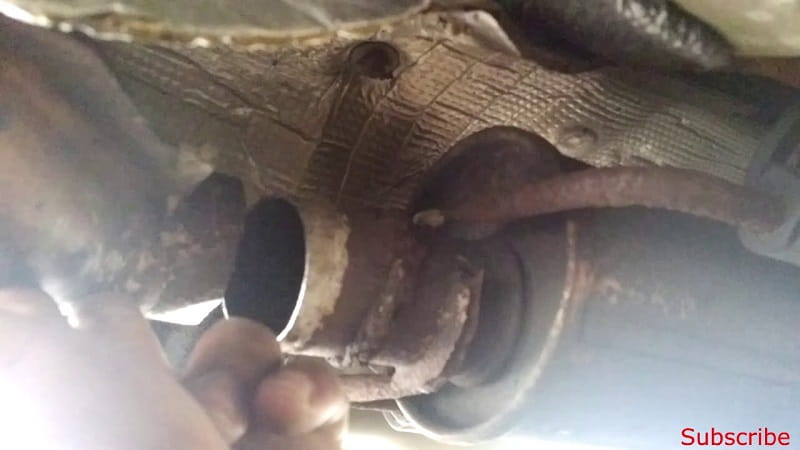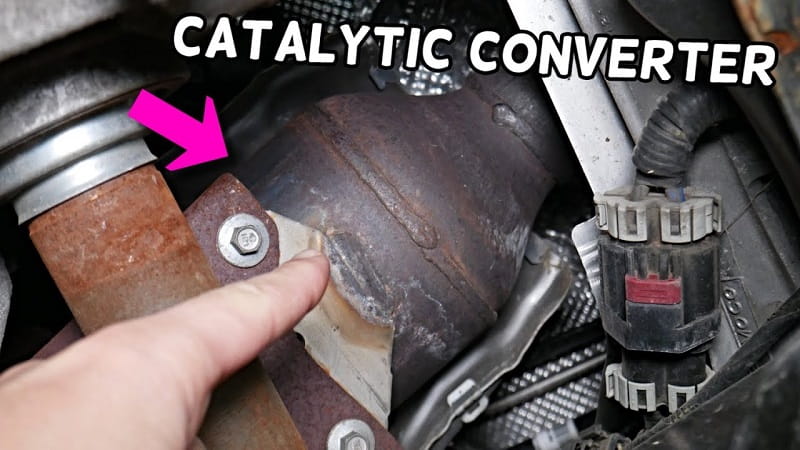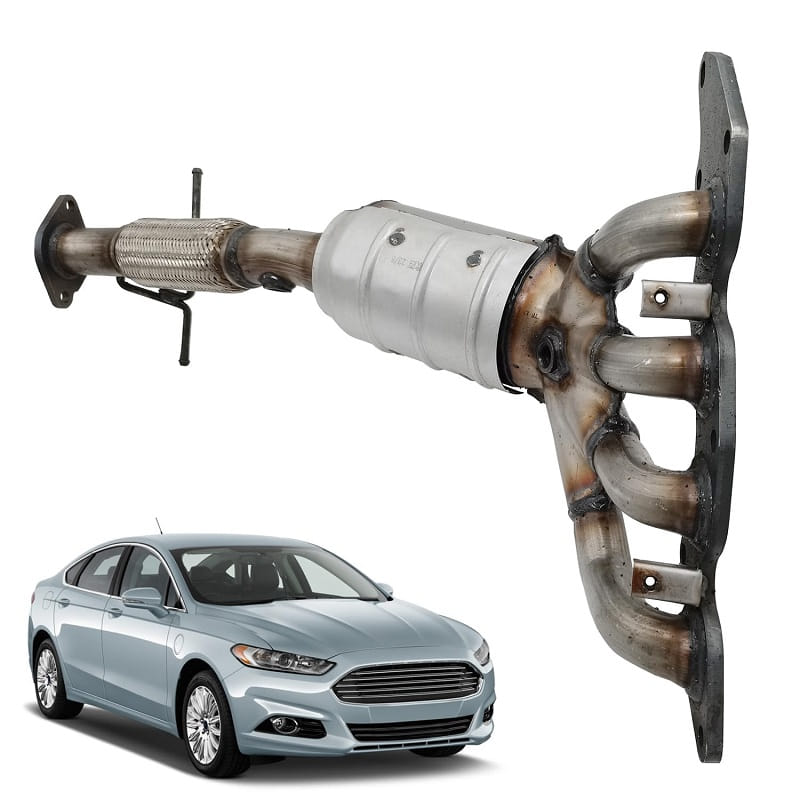This post contains affiliate links. This means I will make a commission at no extra cost to you should you click through and make a purchase [ “As an Amazon Associate, I earn from qualifying purchases.” ]. Read the full disclosure here.
Ford Fusion Catalytic Converter GuideMechanic.Com Are you a proud owner of a Ford Fusion? If so, then understanding the importance and functionality of the catalytic converter is crucial.
In this comprehensive guide, we will delve into the intricacies of the Ford Fusion catalytic converter, providing you with all the essential information you need to know. From its purpose and components to common issues and maintenance tips, we’ve got you covered.
Ford Fusion Catalytic Converter [ What is a Catalytic Converter? ]

In your Ford Fusion’s exhaust system, the catalytic converter plays a vital role in reducing harmful emissions. It is a device that converts toxic gases produced during combustion into less harmful substances before they are released into the atmosphere. By promoting chemical reactions, the catalytic converter helps to minimize the environmental impact of your vehicle.
How Does a Catalytic Converter Work?
The catalytic converter consists of three main components: the catalyst, substrate, and shell. The catalyst is typically made of platinum, palladium, and rhodium, which act as catalysts to speed up the chemical reactions.
The substrate, usually a ceramic or metallic honeycomb structure, provides a large surface area for the catalyst to react with the exhaust gases.
The shell, made of stainless steel or other heat-resistant materials, encloses the catalyst and substrate, protecting them from external damage.
Types of Catalytic Converters Used in Ford Fusion
Ford Fusion models may be equipped with different types of catalytic converters, depending on the specific engine and emission regulations.
The most common types include three-way catalytic converters (TWC), which are capable of reducing three main pollutants: nitrogen oxides (NOx), carbon monoxide (CO), and hydrocarbons (HC).
There are also specialized catalytic converters, such as diesel oxidation catalysts (DOC) for diesel engines, which focus on reducing particulate matter and other diesel-specific pollutants.
Components of a Ford Fusion Catalytic Converter

To better understand how your Ford Fusion’s catalytic converter functions, let’s explore its various components in detail.
The Catalyst
The catalyst is the heart of the catalytic converter, responsible for facilitating chemical reactions that convert harmful pollutants into less harmful substances.
Platinum, palladium, and rhodium are commonly used as catalysts due to their effectiveness in promoting these reactions.
Each metal has its own role in the conversion process, with platinum primarily reducing nitrogen oxides, palladium targeting carbon monoxide and hydrocarbons, and rhodium focusing on nitrogen oxides reduction.
The Substrate
The substrate is the structure that supports the catalyst and provides a large surface area for the chemical reactions to take place.
See Also: Alternator for a Ford F150: DIY Installation Tips and Precautions
It is typically made of a ceramic or metallic material, such as aluminum oxide or stainless steel. The substrate’s honeycomb-like structure allows for a high flow of exhaust gases, maximizing contact between the gases and the catalyst for efficient conversion.
The Shell
Encasing the catalyst and substrate is the shell, which is typically made of stainless steel or another heat-resistant material.
The shell protects the internal components from physical damage and extreme temperatures, ensuring the catalytic converter’s longevity and functionality.
Signs of a Failing Catalytic Converter

Recognizing the signs of a failing catalytic converter in your Ford Fusion is crucial to address issues promptly and avoid further damage. Here are some common symptoms to look out for:
Reduced Engine Performance
If you notice a decrease in your Ford Fusion’s overall performance, such as sluggish acceleration or a lack of power, it could be a sign of a failing catalytic converter. A clogged or malfunctioning converter can restrict the flow of exhaust gases, leading to decreased engine efficiency.
Strange Odors
A failing catalytic converter may emit unusual smells. If you detect a strong rotten egg odor or a sulfur-like smell from your exhaust, it could indicate that the converter is not effectively converting hydrogen sulfide into sulfur dioxide.
Check Engine Light
The check engine light is a crucial indicator of potential issues in your Ford Fusion. If the light is illuminated and stays on, it could be a signal of a malfunctioning catalytic converter. However, it’s essential to have a professional diagnostic test to determine the exact cause of the warning light.
Causes of Catalytic Converter Failure

Understanding the potential causes of catalytic converter failure in your Ford Fusion can help you take preventive measures and avoid costly repairs. Here are some common factors that contribute to catalytic converter issues:
Engine Misfires
Frequent engine misfires can lead to unburned fuel entering the catalytic converter, causing it to overheat and deteriorate.
Misfires can be caused by various factors, such as faulty spark plugs, a malfunctioning ignition system, or fuel delivery problems.
Contamination
Contaminants, such as oil or coolant leaks, can enter the catalytic converter and coat the catalyst, reducing its effectiveness.
This can happen due to worn-out engine components or damaged gaskets. Regular maintenance and addressing leaks promptly can help prevent this type of contamination.
Physical Damage
Physical damage to the catalytic converter, such as impact from road debris or driving over a curb, can result in cracks or dents.
These damages can disrupt the internal flow of exhaust gases and compromise the converter’s performance. Being cautious while driving and avoiding rough road conditions can minimize the risk of physical damage.
Catalytic Converter Maintenance and Cleaning
Maintaining your Ford Fusion’s catalytic converter is essential for optimal performance and longevity. Here are some tips to keep it in excellent condition:
Regular Inspections
Periodically inspect your catalytic converter for signs of physical damage, such as dents or cracks. Additionally, check for any leaks that could contaminate the converter. If you notice any issues, it’s advisable to consult a professional for proper diagnosis and repairs.
Proper Fuel Additives
Using fuel additives specifically designed for catalytic converters can help prevent carbon buildup and prolong their lifespan.
These additives can reduce the formation of deposits on the catalyst, ensuring efficient operation. However, always follow the manufacturer’s recommendations and use additives that are compatible with your Ford Fusion’s engine.
Regular Maintenance of Engine Components
Well-maintained engine components, such as spark plugs, oxygen sensors, and air filters, contribute to the overall health of your catalytic converter.
Replacing worn-out parts and following the recommended maintenance schedule can help prevent issues that may affect the converter’s performance.
Replacing a Ford Fusion Catalytic Converter
If your catalytic converter is beyond repair, replacement becomes necessary. Here’s what you need to consider when selecting a new catalytic converter for your Ford Fusion:
Compatibility
Ensure that the replacement catalytic converter is compatible with your Ford Fusion’s specific make, model, and engine size. Consult the vehicle’s manual or seek professional advice to ensure a proper fit.
Compliance with Emission Regulations
Make sure the replacement catalytic converter complies with local emission regulations. Different regions may have specific requirements, and using a non-compliant converter can lead to legal consequences or failed emissions tests.
Quality and Warranty
Choose a catalytic converter from a reputable manufacturer to ensure quality and reliability. Look for products with warranties that cover manufacturing defects and premature failures, providing you with peace of mind.
Legal Requirements and Emissions Testing
Complying with the legal requirements surrounding catalytic converters and emissions testing is essential for Ford Fusion owners. Here’s what you need to know:
Local Emission Standards
Understand the emission standards set by your local authorities. These standards dictate the acceptable levels of pollutants emitted by vehicles and often specify the type and functionality of catalytic converters required.
Emissions Testing
Periodic emissions testing is typically required to ensure your Ford Fusion meets the established standards. Failing the test may result in penalties or restrictions on vehicle usage.
Regular maintenance and timely repairs can help ensure your catalytic converter performs optimally during emissions testing.
Aftermarket Catalytic Converters for Ford Fusion
If you’re considering aftermarket options for your Ford Fusion’s catalytic converter, it’s essential to weigh the benefits and drawbacks. Here’s what you should know:
Variety of Options
Aftermarket catalytic converters offer a wide range of options in terms of price, performance, and construction materials. You can choose a converter that suits your specific needs and budget.
Quality and Compatibility
Ensure that the aftermarket catalytic converter meets quality standards and is compatible with your Ford Fusion. Research reputable brands and consult experts or fellow Ford Fusion owners for recommendations.
Legal Compliance
Verify that the aftermarket catalytic converter complies with local emission regulations. Non-compliant converters can result in legal consequences or failed emissions tests.
Frequently Asked Questions
Here are answers to some common questions related to Ford Fusion catalytic converters:
How much does a Ford Fusion catalytic converter cost?
The cost of a Ford Fusion catalytic converter can vary depending on various factors such as the model year, engine size, and whether you choose an original equipment manufacturer (OEM) or aftermarket converter.
On average, the price can range from $200 to $1000 or more. It’s important to consider the quality and warranty when comparing prices to ensure you’re getting a reliable and durable product.
Can I clean a clogged catalytic converter?
While some online sources may suggest methods for cleaning a clogged catalytic converter, it’s important to note that these methods are often temporary and may not effectively restore its full functionality.
In most cases, a severely clogged or damaged catalytic converter will require replacement. Attempting to clean it yourself can also lead to further damage. It’s best to consult with a professional mechanic or exhaust specialist to determine the best course of action.
How long does a Ford Fusion catalytic converter last?
The lifespan of a catalytic converter can vary depending on various factors such as driving conditions, maintenance practices, and overall vehicle health. On average, a well-maintained catalytic converter in a Ford Fusion can last between 100,000 to 150,000 miles.
However, it’s important to note that certain factors, such as engine misfires, coolant or oil leaks, and using low-quality fuel, can significantly reduce its lifespan. Regular maintenance and addressing issues promptly can help prolong the life of your catalytic converter.
Can I drive my Ford Fusion with a bad catalytic converter?
Driving your Ford Fusion with a malfunctioning or clogged catalytic converter is not recommended. A failing converter can negatively impact your vehicle’s performance, fuel efficiency, and emissions.
Additionally, it may cause further damage to other components of your exhaust system. If you suspect an issue with your catalytic converter, it’s best to have it inspected and repaired by a qualified mechanic to ensure the proper functioning of your vehicle.
Are there any alternatives to a catalytic converter?
Catalytic converters are a crucial component in reducing harmful emissions and ensuring compliance with environmental regulations.
As of now, there are no practical alternatives that can fully replace a catalytic converter’s function in a Ford Fusion or any other vehicle.
Removing or bypassing the catalytic converter is illegal in most regions and can lead to fines or other legal consequences. It’s essential to maintain and repair your catalytic converter to minimize the environmental impact of your vehicle.
Conclusion
In conclusion, understanding the importance of the catalytic converter in your Ford Fusion is vital for both your vehicle’s performance and the environment.
The catalytic converter plays a crucial role in reducing harmful emissions, converting them into less harmful substances.
By recognizing the signs of a failing catalytic converter, understanding the causes of failure, and following maintenance tips, you can ensure its optimal performance and longevity.
Whether it’s regular inspections, using proper fuel additives, or choosing the right replacement, taking care of your catalytic converter is essential. By doing so, you contribute to a cleaner and more sustainable driving experience for yourself and the environment.
- Vegan Food Trucks for Sale by Owner - July 12, 2025
- Ice Cream Food Trucks for Sale - July 11, 2025
- Breakfast Food Trucks for Sale - July 11, 2025
